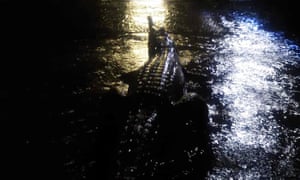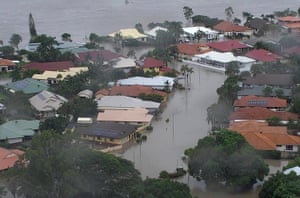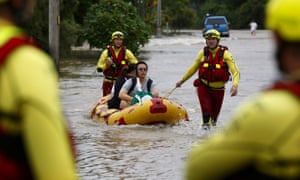Extract from The Guardian
State government warns residents to beware of crocodiles and snakes, which were reportedly heading into suburban areas
After eight days of heavy monsoonal rain, authorities in the north Queensland city of Townsville had no choice but to open the floodgates of the Ross River Dam, deliberately flooding about 2,000 homes.
The decision was made as the Queensland government also published a warning to people to beware of crocodiles, snakes and other wildlife, which were reported to have left the swollen river and headed into some suburban areas.
Some parts of Queensland have had more than 1.5m of rain since last weekend. At Ingham, north of Townsville, 419mm fell in a single day on Sunday.
At Townsville almost 1m was recorded at Townsville airport across eight days of torrential rain. The average annual rainfall for the same weather gauge is 1127.9mm.

The decision was made as the Queensland government also published a warning to people to beware of crocodiles, snakes and other wildlife, which were reported to have left the swollen river and headed into some suburban areas.
Some parts of Queensland have had more than 1.5m of rain since last weekend. At Ingham, north of Townsville, 419mm fell in a single day on Sunday.
At Townsville almost 1m was recorded at Townsville airport across eight days of torrential rain. The average annual rainfall for the same weather gauge is 1127.9mm.

With the floodgates fully open, about 1,900 cubic metres of water a second was released. That stabilised the dam, which on Monday afternoon was holding 523,475 megalitres, or 225% its typical capacity.
But the fast-flowing water release caused the Ross River to break its banks and inundate several low-lying areas on Townsville’s south side.
Near the suburb of Idalia, a flooded road was transformed into a temporary boat ramp by residents, who used their single-motor fishing boats to help people escape their flooded homes.
About 1,000 people spent Sunday night in evacuation shelters, and emergency services conducted 18 “swiftwater” rescues, where people were pulled from flowing floodwaters.
The Ross River reached its peak about 11am on Tuesday and was expected to remain at that level until late on Tuesday night. But the weather remains unpredictable, with a monsoon trough still hovering above north Queensland, and threatening to bucket more rain on the region.
Schools were closed and students will be told to remain at home on Tuesday. With the Bruce Highway cut to the north and south of Townsville, supermarkets began to run short of food. Fears of critical shortages were allayed when the Townsville airport was reopened about 2pm and supplies were able to be flown in.
Residents were also warned to conserve water as it flowed through town; the flooding caused pipes to burst at the Douglas water treatment plant.
The Queensland premier, Annastacia Palaszczuk, said she had “never seen” a flood like this before. She said the floodgates had to be opened “to make sure the water had somewhere to go”.
Palaszczuk warned people on Monday afternoon that the threat of flash-flooding remained, and that residents should not to be complacent.
“As we know there is still heavy rainfall across the area, this monsoonal trough doesn’t seem to want to move much at all,” Palaszczuk said.
The state’s disaster coordinator, deputy police commissioner Bob Gee, told people not to drive unless necessary.
“We are still in response phase,” Gee said. “It’s really critical that we don’t have a false sense of security, people need to stay away.”

Queensland’s environment minister, Leeanne Enoch, warned residents about the dangers posed by crocodiles.
“Crocodiles prefer calmer waters and they may move around in search of a quiet place to wait for floodwaters to recede,” she said. “Crocodiles may be seen crossing roads and, when flooding recedes, crocodiles can turn up in unusual places such as farm dams or waterholes where they have not been seen before.
“Similarly, snakes are very good swimmers and they too may turn up unexpectedly.”
Roberts, who lives in low-lying Hermit Park, was also angry about the decision to release water from the Ross River dam.
“We were lambs to the slaughter,” he said. “Our homes have been sacrificed to save the rest of Townsville. It should never have been this bad. Why didn’t they have releases earlier and give the water a chance to get away?
“Heads should roll over this.”
Roberts insists the water won’t reach their second storey and they will not leave their home of 14 years as they have an electricity generator, food, water and a radio.
“It has been a hair-raising experience but ... I would rather be sitting here than in a shelter for the next week not knowing what the hell is going on with what we have here.”
Neighbour Paul Shafer understood the decision to open the floodgates was necessary, but knows he is paying the price.
He watched the floodwaters rising under his home for days before he finally left on Sunday when he heard the dam floodgates would be fully opened.
Townsville under water as north Queensland drenched in ‘unprecedented’ rain – video report
He used a kayak to paddle his wife, daughters and the family dog to safety, then he and a neighbour walked out through chest-high water pushing a dog on a boogie board.
Shafter has lost two cars, a truck and a caravan in the flood along with the renovated lower level of his Queenslander.
Prof Jamie Pittock from the Fenner School of Environment and Society at the Australian National University said the need to spill water from the dam highlighted the limits to using dams for flood control.
“Dams cannot control the biggest floods,” Pittock said. “Large flood return frequency is projected to worsen with climate change.”

No comments:
Post a Comment